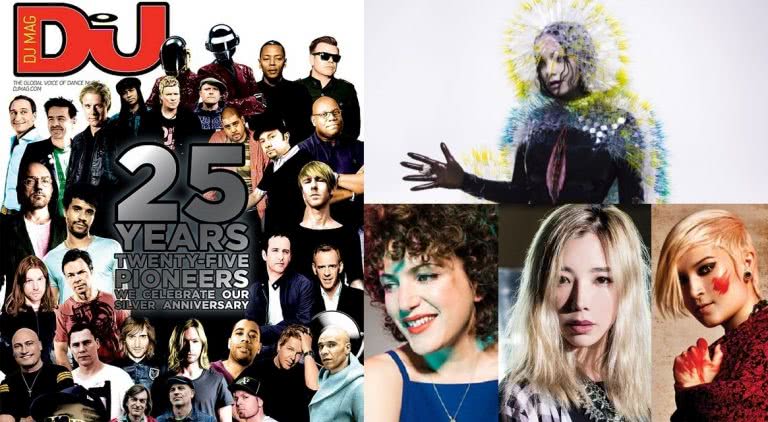DJ Magazine has just announced its silver anniversary with a special issue – ‘25 Years: Twenty-Five Pioneers’.
In my news stream of countless music publications clamouring for attention, it only captured my cursor for a moment – questionable font choices, sure; lo-res Photoshopping skills, expected – but one thing resoundingly stood out: the entire cover from the self-proclaimed “global voice of dance music” features only male ‘pioneers’.
In a news cycle where the top headlines proclaim that a 12-year-old girl in Queensland is having to go to court in order to get an abortion and Hillary Clinton is being harangued for playing ‘the woman card’ (whatever that is), the fact a dance magazine has excluded any women, cisgendered or otherwise, from its list of a quarter century of trailblazers in the music industry seems a sad, if not unsurprising, drop in the ocean of women being maligned, underrepresented and silenced right here in 2016.
You don’t have to look much further than the comments section of any report about the DJ Mag feature to see plenty of support from men, and some sadly misinformed women, about the list – but is writing women out of the history of ‘pioneering artists’ (meaning inventive, innovative and revolutionary) such a cliché that it’s just coldly accepted? Have we women in music heard it all too much before for it to be even considered shocking that our female role models are swept aside?
–

DJ Mag’s 25 Years cover
Unpacking the issue a little further, in the sweeping category of dance music – a genre that has no small history in uniting people and championing outsiders, from techno originating in Detroit and rising out of post-industrial decline and riot-fuelled segregation; house music climbing out of the gay scene in Chicago; and outcast raves across the UK; it’s more than a little depressing that a magazine that represents itself as a landmark voice in the world of dance and DJs presents a list of commercial acts including David Guetta, Vanilla Ice and Daft Punk to name a few as pioneers, rather than include any of the thousands of women and minorities that have a had a place catapulting dance music into a respected art form in the recent past.
Of course, DJ Magazine is no stranger to controversy of excluding female artists, producers and DJs, with its much eye-rolled-about annual Top 100 List yearly being called out for lack of diversity. Indeed, the magazine produced an issue just a few months ago dedicated to ‘female DJs’, but apparently, sensing some backlash to their lack of inclusion in the 25-year list, the contributing editor issued the following statement:
“The final list of 25 was the result of much debate in the office and you may notice just from glancing at the cover that there are no women in the 25 — a fact we’re all too aware of at DJ Mag. Is there anyone we should have included? And if so in place of who?”
The magazine further supported its decision in a statement to The Fader later, saying: “… of the 25 we have chosen none can be refuted and [we] made a conscious decision to avoid tokenism”. What could be tokenistic about including female champions of dance music in a list of ‘overall pioneers’ rather than being segregated to their own issue under the banner ‘Women in Dance Music Special’?
–
Whilst there aremany press shots awkwardly cropped into the cover that arguably represent artists deserving of the title ‘pioneer’, can the likes of Guetta and Deadmau5 really be listed among the names of artists who have truly originated or innovated anything –you know, like Aphex Twin or Jeff Mills or Björk?
The out-of-touch list is only further proof of men being allowed to dictate who has made contributions to music – or any scene. Perhaps it’s time we turn away completely from any media that refuses to acknowledge the involvement of anyone other than those to adhere to the status quo. If DJ Mag’s criteria and discussions only allocated an illustrious title to men, then it should be happy to change its measures to a more thorough and inclusive standard.
Here in Australia, our dance music world has more women at the forefront than ever before. Nina Las Vegas, both a DJ and producer, is the former presenter of House Party and Mix Up Exclusives on triple j, and now a full-time label head and touring DJ who is in no small part responsible for promoting Australian music across the globe. Sydney’s Anna Lunoe is one of the most celebrated DJs on the main festival circuit around the world and particularly in the US, playing Coachella, Lollapalooza and Ultra and releasing music on Mad Decent and Future Classic. And who could forget Fenella Kernebone, the host of triple j’s iconic show The Sound Lab, which was on air for over 11 years showcasing incredible international music as well as emerging electronic acts? Then there are the countless female lead and solo acts; the likes of George Maple, Nicole Millar, Wafia, Kucka, Sofie, Sui Zhen, Rainbow Chan, Kllo, Mei Saraswati, Banoffee and KLP, all of whom DJ and/or produce electronic music. Plus the countless women booking artists, managing labels, working in publicity, radio or journalism here, who have platformed dance music for as long as it’s existed.
–
So in response toDJ Mag‘s exclusively male list of pioneering artists from the last 25 years, here are a few of the many artists who happen to be of the female persuasion, and are well deserving of the title ‘pioneer’:
Annie Nightingale– was the first female presenter on BBC Radio 1 and its longest-serving. Nightingale curated “seven decades of unmissable music from the 1950s through to today” –one of the first presenters on a main station to play from CDs. Oh, and at 76 she still spins regularly,having just presented a show with mixes from Flume, NGHTMRE and MJ Cole.
Björk– of course the Icelandic singer-songwriter, multi-instrumentalist, and occasional DJ deserves to be on this list as much as Aphex Twin. She has constantly fought against the barriers for women in music, telling any journalist who listens that she produces her own music. In a world where Kanye West can have more than 24 features on his record and countless writers and people still call his music his, Björk, after having two features on his latest album, is often just referred to as a singer. Her seminal sound, and often surprise DJ sets, are always boundary-pushing.
Kemistry & Storm – were an English drum and bass DJ and recording duo of the 1990s. Along with Goldie, whom Kemistry had introduced to the drum and bass scene in the early years of the decade, they founded the Metalheadz label in 1994. They led Metalheadz for two-and-a-half years before leaving the label. The success of the DJ-Kicks album brought them opportunities to DJ internationally and has been described as “paving the way for other, younger, female DJs”. And of course, Goldie, whose shiny teeth are unmissable on the cover.
Mary Anne Hobbs – has long been heralded as one of the instrumental figures in dubstep. A decade ago (after a lifetime working in music both as a DJ on BBC1 and a critic at NME) she presented Dubstep Warz, a two-hour-long epic featuring Mala, Coki and Kode9, among many others, and plugged some of the first cuts by Burial and Benga on primetime air. The moment has gone down in history as a genre defining moment for dubstep, where it had reached a stage of critical acclaim. Mala even paid a special tribute to the “true radio pioneer” in a recent Facebook post.
Fatima Al Qadiri – sure, this Hyberdub and Warp Records artist is a little lesser known than, say, Vanilla Ice, but this producer and DJ from Kuwait is surely one of the only musicians out there in dance music weaving Muslim anthems throughout her sets. Each of her records explore a differing political or imagined theme. Al Qadiri is a jack of all trades: she writes a well-informed column on global music, DJs, and exhibits her visual art in galleries around the world.
Annie Mac – She’s Radio 1’s champion of new music, the successor to Zane Lowe and John Peel, but she’s also the boss of a booming clubbing brand. Responsible for pushing the likes of house producer Duke Dumont, Disclosure and Jamie xx from the underground into headliners after ten years on the airwaves and numerous coveted residences in Ibiza and Vegas.
Maya Jane Coles – is somewhat of an enigma in today’s music world; on a typical Maya Jane Coles record, she will have written, produced, engineered, arranged, mixed and performed every element of the track; sometimes top-lining and, on most occasions, even designing the sleeve artwork too.
Miss Kittin – Rightly placed as one of the most revered and recognisable artists in dance music today (apart from by DJ Mag), Miss Kittin is heralded as one of the champions of the French-electro scene that is responsible for the ever-evolving pop world.
Smokin Jo – won the #1 DJ spot by DJ Mag back in 1992 (did they forget?), and she has played in pretty much every corner of the globe and in every major nightspot you could care to mention. Womb in Tokyo, Panorama Bar in Berlin, Made/Warung in Brazil, Cavo Paradiso in Mykonos, Crobar in New York, S Zouk in Singapore, Fabric in London… and still for the past 15 years has held a residency at the infamous Space for We Love in Ibiza.
Tokimonsta – Jennifer Lee is known for her unique take on indie electronic/R&B/dance music that has seen dozens of male vocalists clamour for collaborations with her. The first female signed to Flying Lotus’ Brainfeeder imprint, she now is hyped by Ultra and is one of the people responsible for bringing the beats-LA sound to a global audience.
Magda – got her start as Richie Hawtin’s opening DJ. ‘She’s A Dancing Machine’, released in 2006 through Hawtin’s label, was truly seminal. It intricately layered 70 tracks into 16 sections and displayed an almost unprecedented level of energy for a minimal DJ mix.
Gudrun Gut – this punk and early adopter of computer music is one of Berlin’s most influential forces. She was a founding member of Einstürzende Neubauten and of course musician, performance artist, DJ, radio presenter, club organiser, cultural ambassador and label owner of Monika Records. Gut gained recognition leading the all-female post punk group Malaria! and her long-running showcase of new music, Ocean Club Radio.
Miss Djax – the alias of Saskia Slegers. Not only an excellent DJ, she is also the founder of Djax records, a label every real techno, acid, or dance freak in general should have heard of.
DJ Spinderella – just the DJ behind one of the most successful hip hop acts of all time, Salt N Pepa.
Sarah Lockhart – whose Tempa Recordings imprint paved the way for today’s dubstep takeover and whose term as Rinse FM’s station manager has ushered in grime’s second wave.
–
Who else do you think should have been recognised for pioneering contributions to dance music in the last 25 years? Let us know in the comments below.
–
Rebecca Florence is a Melbourne-based music writer, broadcaster, publicist and dancefloor enthusiast. She runs a publicity company specialising in emerging electronic and dance music, calledFlow + Hustle PR.


































